中考英语复习--八大时态复习学案
图片预览
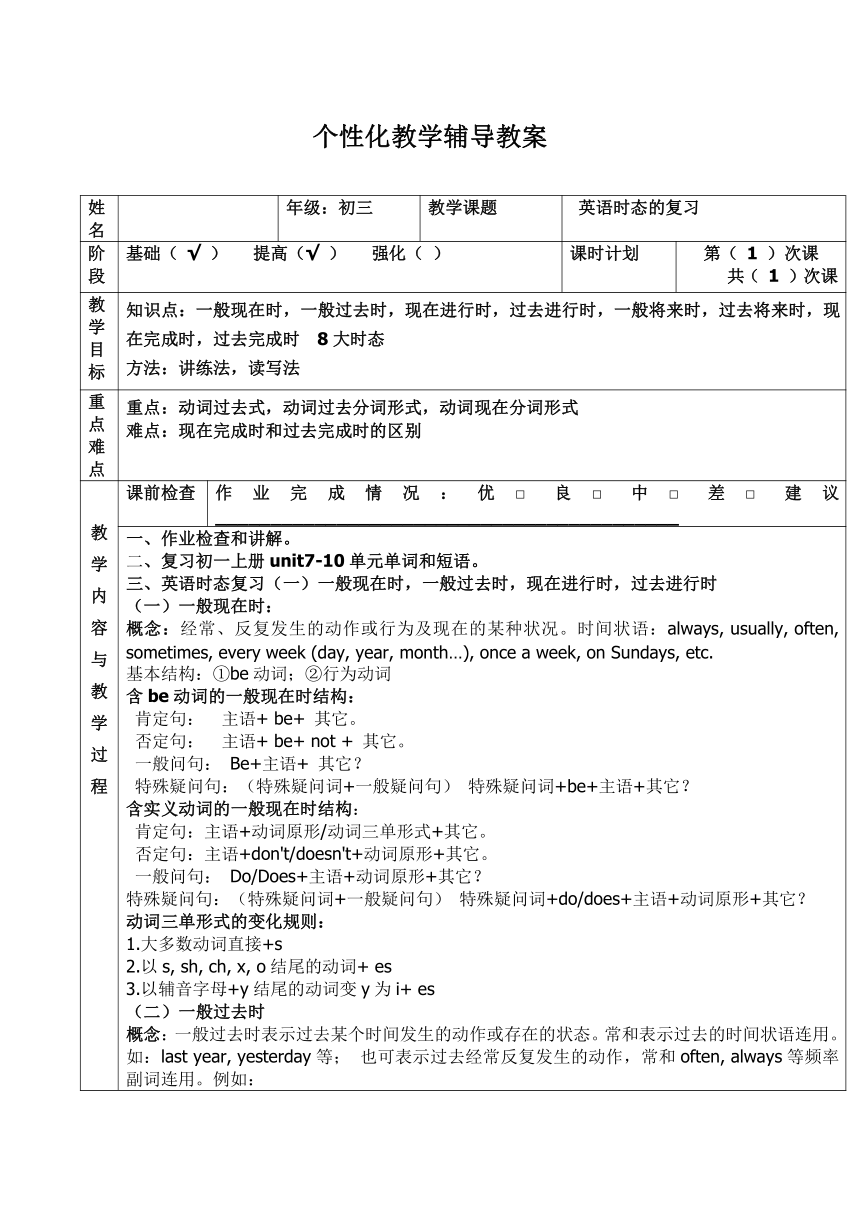
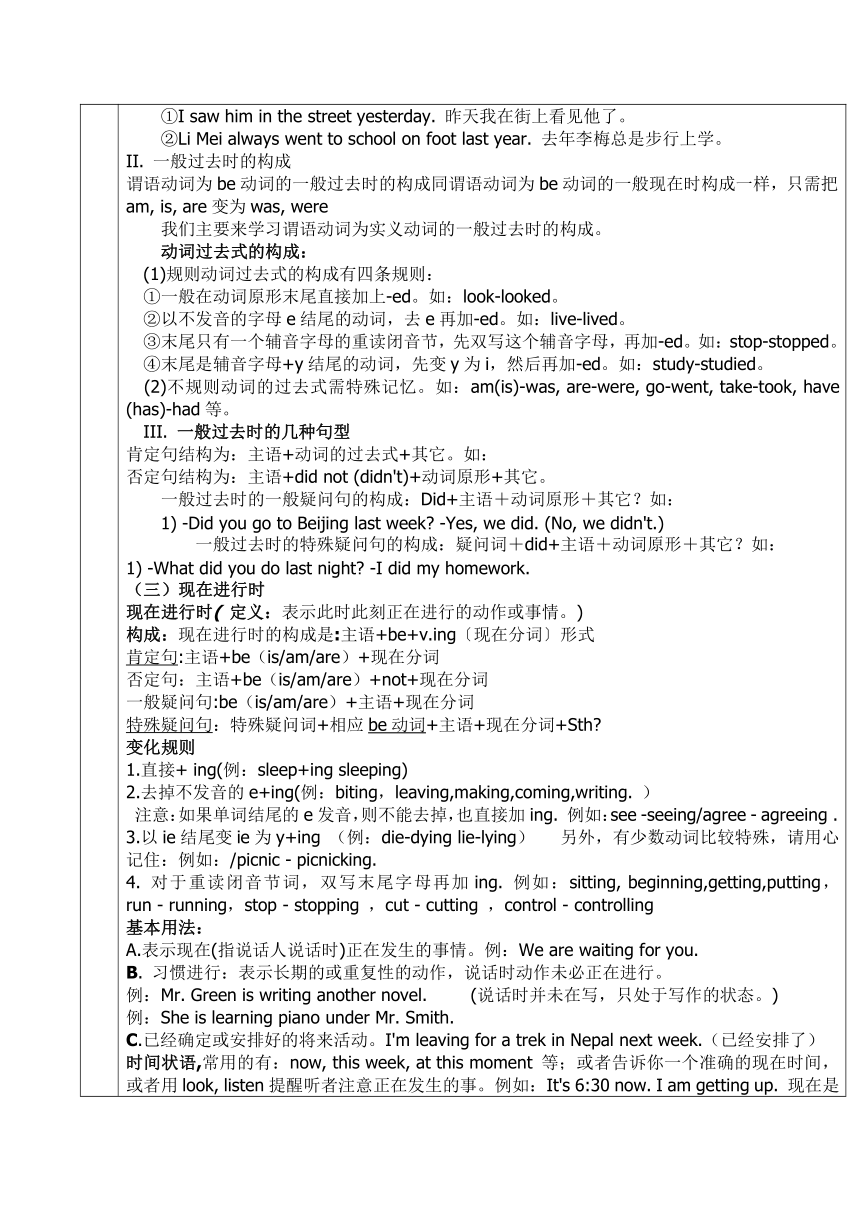
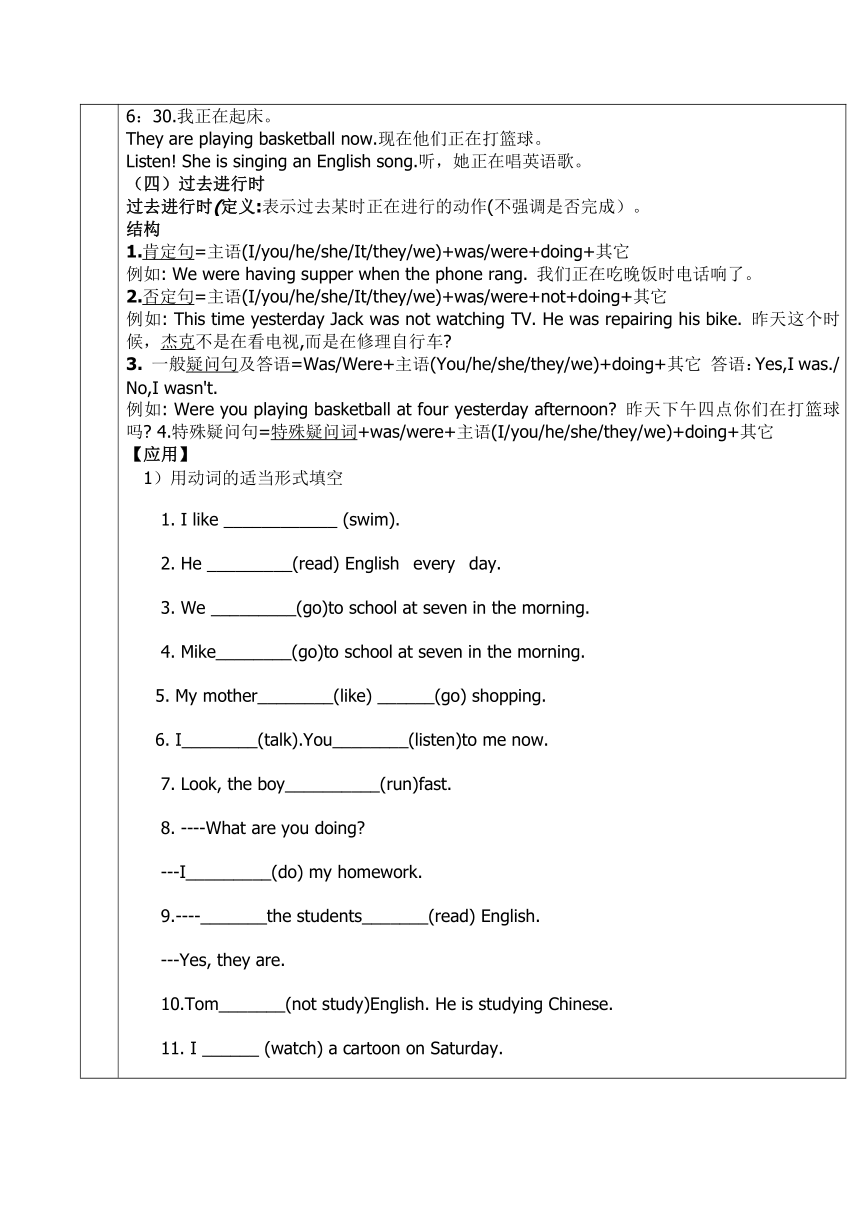
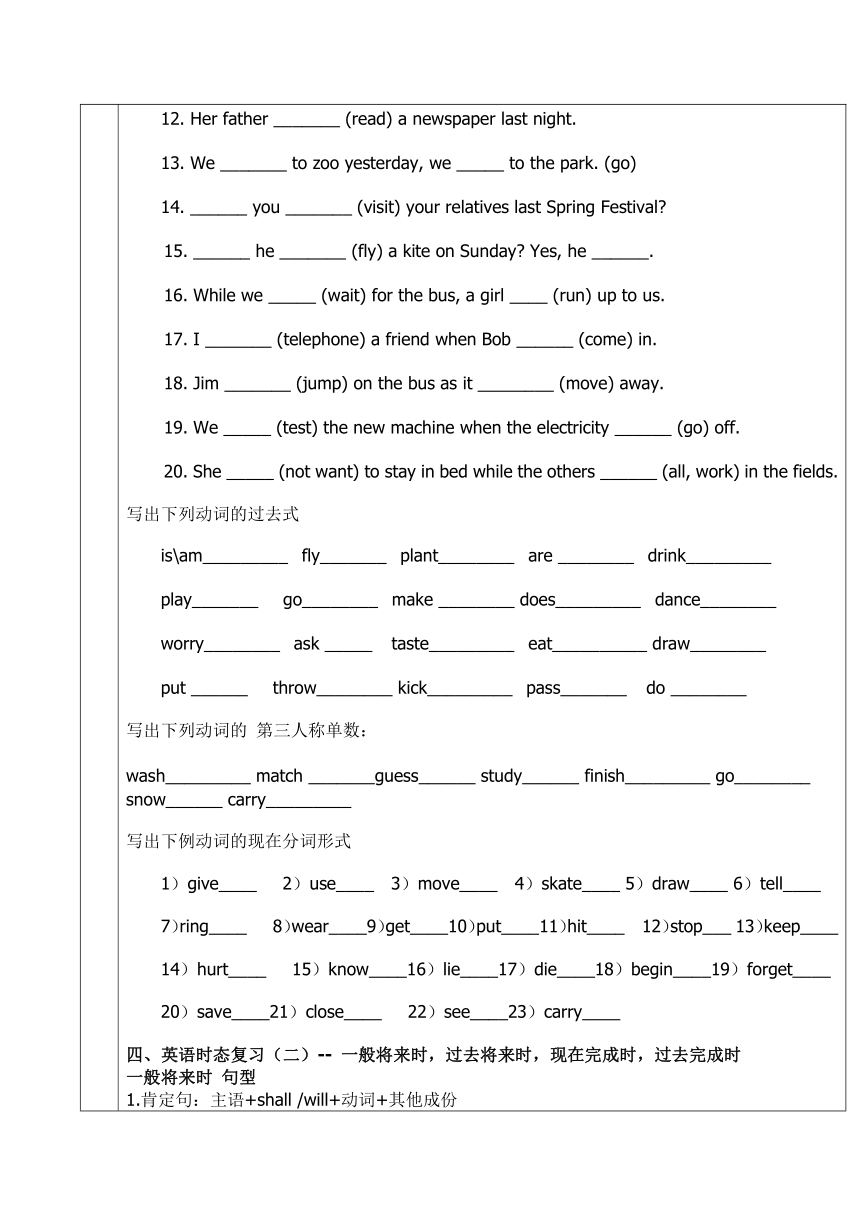
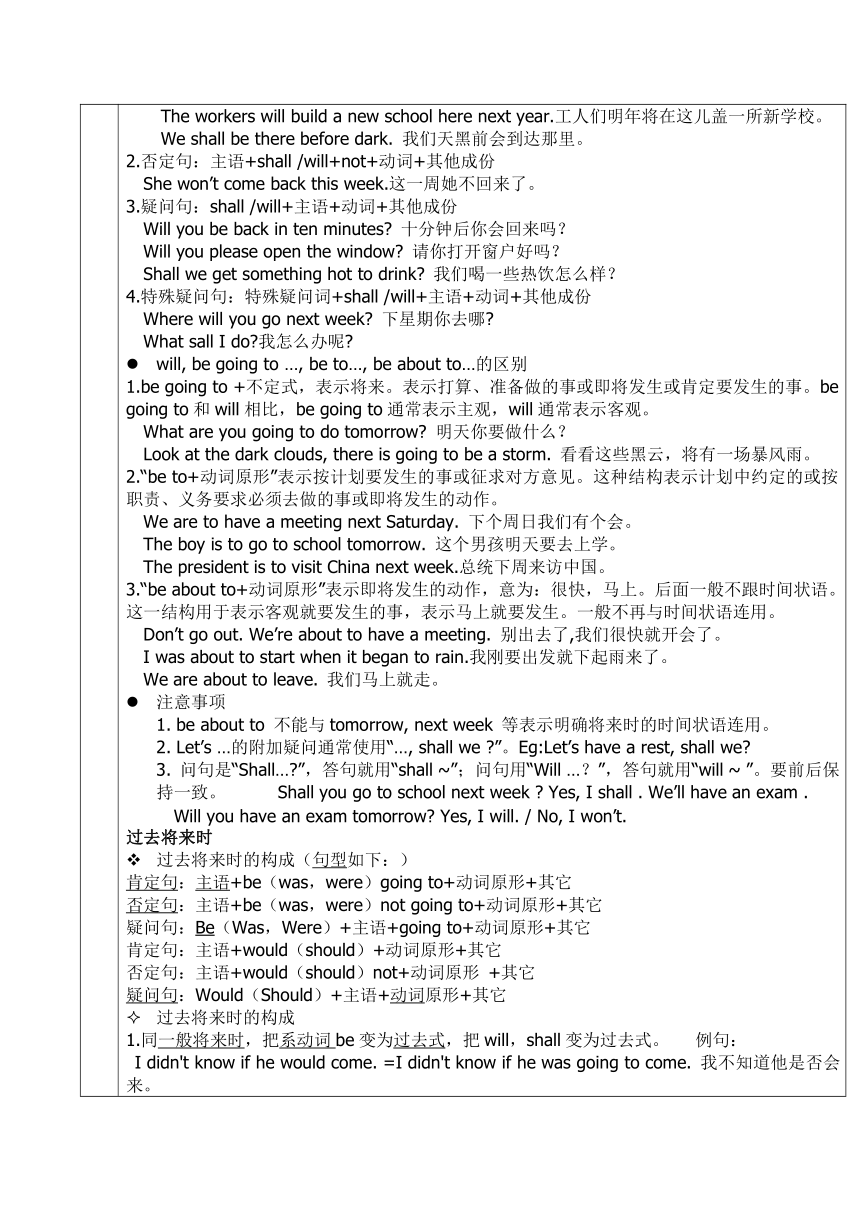
文档简介
个性化教学辅导教案
姓名 年级:初三 教学课题 英语时态的复习
阶段 基础( √ ) 提高(√ ) 强化( ) 课时计划 第( 1 )次课 共( 1 )次课
教学目标 知识点:一般现在时,一般过去时,现在进行时,过去进行时,一般将来时,过去将来时,现在完成时,过去完成时 8大时态方法:讲练法,读写法
重点难点 重点:动词过去式,动词过去分词形式,动词现在分词形式难点:现在完成时和过去完成时的区别
教学内容与教学过程 课前检查 作业完成情况:优□ 良□ 中□ 差□ 建议__________________________________________
一、作业检查和讲解。二、复习初一上册unit7-10单元单词和短语。三、英语时态复习(一)一般现在时,一般过去时,现在进行时,过去进行时(一)一般现在时:概念:经常、反复发生的动作或行为及现在的某种状况。时间状语:always, usually, often, sometimes, every week (day, year, month…), once a week, on Sundays, etc.基本结构:①be动词;②行为动词含be动词的一般现在时结构: 肯定句: 主语+ be+ 其它。 否定句: 主语+ be+ not + 其它。 一般问句: Be+主语+ 其它? 特殊疑问句:(特殊疑问词+一般疑问句) 特殊疑问词+be+主语+其它?含实义动词的一般现在时结构: 肯定句:主语+动词原形/动词三单形式+其它。 否定句:主语+don't/doesn't+动词原形+其它。 一般问句: Do/Does+主语+动词原形+其它? 特殊疑问句:(特殊疑问词+一般疑问句) 特殊疑问词+do/does+主语+动词原形+其它?动词三单形式的变化规则:大多数动词直接+s以s, sh, ch, x, o结尾的动词+ es以辅音字母+y结尾的动词变y为i+ es(二)一般过去时 概念:一般过去时表示过去某个时间发生的动作或存在的状态。常和表示过去的时间状语连用。如:last year, yesterday等; 也可表示过去经常反复发生的动作,常和often, always等频率副词连用。例如: ①I saw him in the street yesterday. 昨天我在街上看见他了。 ②Li Mei always went to school on foot last year. 去年李梅总是步行上学。II. 一般过去时的构成谓语动词为be动词的一般过去时的构成同谓语动词为be动词的一般现在时构成一样,只需把am, is, are变为was, were 我们主要来学习谓语动词为实义动词的一般过去时的构成。 动词过去式的构成: (1)规则动词过去式的构成有四条规则: ①一般在动词原形末尾直接加上-ed。如:look-looked。 ②以不发音的字母e结尾的动词,去e再加-ed。如:live-lived。 ③末尾只有一个辅音字母的重读闭音节,先双写这个辅音字母,再加-ed。如:stop-stopped。 ④末尾是辅音字母+y结尾的动词,先变y为i,然后再加-ed。如:study-studied。 (2)不规则动词的过去式需特殊记忆。如:am(is)-was, are-were, go-went, take-took, have (has)-had等。 III. 一般过去时的几种句型肯定句结构为:主语+动词的过去式+其它。如:否定句结构为:主语+did not (didn't)+动词原形+其它。 一般过去时的一般疑问句的构成:Did+主语+动词原形+其它?如: 1) -Did you go to Beijing last week -Yes, we did. (No, we didn't.) 一般过去时的特殊疑问句的构成:疑问词+did+主语+动词原形+其它?如:1) -What did you do last night -I did my homework.(三)现在进行时现在进行时( 定义:表示此时此刻正在进行的动作或事情。) 构成:现在进行时的构成是:主语+be+v.ing〔现在分词〕形式 肯定句 ( http: / / www.21cnjy.com / " \o "欢迎登陆21世纪教育网 ):主语+be(is/am/are)+现在分词 否定句:主语+be(is/am/are)+not+现在分词 一般疑问句:be(is/am/are)+主语+现在分词 特殊疑问句 ( http: / / www.21cnjy.com / " \o "欢迎登陆21世纪教育网 ):特殊疑问词+相应be动词 ( http: / / www.21cnjy.com / " \o "欢迎登陆21世纪教育网 )+主语+现在分词+Sth 变化规则直接+ ing(例:sleep+ing sleeping) 去掉不发音的e+ing(例:biting,leaving,making,coming,writing. ) 注意:如果单词结尾的e发音,则不能去掉,也直接加ing. 例如:see -seeing/agree - agreeing . 3.以ie结尾变ie为y+ing (例:die-dying lie-lying) 另外,有少数动词比较特殊,请用心记住:例如:/picnic - picnicking. 4. 对于重读闭音节词,双写末尾字母再加ing. 例如:sitting, beginning,getting,putting, run - running,stop - stopping ,cut - cutting ,control - controlling 基本用法:A.表示现在(指说话人说话时)正在发生的事情。例:We are waiting for you. B. 习惯进行:表示长期的或重复性的动作,说话时动作未必正在进行。 例:Mr. Green is writing another novel. (说话时并未在写,只处于写作的状态。) 例:She is learning piano under Mr. Smith. C.已经确定或安排好的将来活动。I'm leaving for a trek in Nepal next week.(已经安排了) 时间状语,常用的有:now, this week, at this moment 等;或者告诉你一个准确的现在时间,或者用look, listen提醒听者注意正在发生的事。例如:It's 6:30 now. I am getting up. 现在是6:30.我正在起床。 They are playing basketball now.现在他们正在打篮球。 Listen! She is singing an English song.听,她正在唱英语歌。 (四)过去进行时过去进行时(定义:表示过去某时正在进行的动作(不强调是否完成)。结构1.肯定句 ( http: / / www.21cnjy.com / " \o "欢迎登陆21世纪教育网 )=主语(I/you/he/she/It/they/we)+was/were+doing+其它 例如: We were having supper when the phone rang. 我们正在吃晚饭时电话响了。 2.否定句 ( http: / / www.21cnjy.com / " \o "欢迎登陆21世纪教育网 )=主语(I/you/he/she/It/they/we)+was/were+not+doing+其它 例如: This time yesterday Jack was not watching TV. He was repairing his bike. 昨天这个时候,杰克 ( http: / / www.21cnjy.com / " \o "欢迎登陆21世纪教育网 )不是在看电视,而是在修理自行车 3. 一般疑问句 ( http: / / www.21cnjy.com / " \o "欢迎登陆21世纪教育网 )及答语=Was/Were+主语(You/he/she/they/we)+doing+其它 答语:Yes,I was./ No,I wasn't. 例如: Were you playing basketball at four yesterday afternoon 昨天下午四点你们在打篮球吗 4.特殊疑问句=特殊疑问词 ( http: / / www.21cnjy.com / " \o "欢迎登陆21世纪教育网 )+was/were+主语(I/you/he/she/they/we)+doing+其它 【应用】 1)用动词的适当形式填空 1. I like ____________ (swim). 2. He _________(read) English every day. 3. We _________(go)to school at seven in the morning. 4. Mike________(go)to school at seven in the morning.5. My mother________(like) ______(go) shopping.6. I________(talk).You________(listen)to me now. 7. Look, the boy__________(run)fast. 8. ----What are you doing ---I_________(do) my homework. 9.----_______the students_______(read) English. ---Yes, they are. 10.Tom_______(not study)English. He is studying Chinese.11. I ______ (watch) a cartoon on Saturday. 12. Her father _______ (read) a newspaper last night. 13. We _______ to zoo yesterday, we _____ to the park. (go) 14. ______ you _______ (visit) your relatives last Spring Festival 15. ______ he _______ (fly) a kite on Sunday Yes, he ______.16. While we _____ (wait) for the bus, a girl ____ (run) up to us.17. I _______ (telephone) a friend when Bob ______ (come) in.18. Jim _______ (jump) on the bus as it ________ (move) away.19. We _____ (test) the new machine when the electricity ______ (go) off.20. She _____ (not want) to stay in bed while the others ______ (all, work) in the fields.写出下列动词的过去式 is\am_________ fly_______ plant________ are ________ drink_________ play_______ go________ make ________ does_________ dance________ worry________ ask _____ taste_________ eat__________ draw________ put ______ throw________ kick_________ pass_______ do ________写出下列动词的 第三人称单数: wash_________ match _______guess______ study______ finish_________ go________ snow______ carry_________写出下例动词的现在分词形式1)give____ 2)use____ 3)move____ 4)skate____ 5)draw____ 6)tell____7)ring____ 8)wear____9)get____10)put____11)hit____ 12)stop___ 13)keep____14)hurt____ 15)know____16)lie____17)die____18)begin____19)forget____20)save____21)close____ 22)see____23)carry____四、英语时态复习(二)-- 一般将来时,过去将来时,现在完成时,过去完成时一般将来时 句型
1.肯定句:主语+shall /will+动词+其他成份
The workers will build a new school here next year.工人们明年将在这儿盖一所新学校。
We shall be there before dark. 我们天黑前会到达那里。
2.否定句:主语+shall /will+not+动词+其他成份
She won’t come back this week.这一周她不回来了。
3.疑问句:shall /will+主语+动词+其他成份
Will you be back in ten minutes 十分钟后你会回来吗?
Will you please open the window 请你打开窗户好吗?
Shall we get something hot to drink 我们喝一些热饮怎么样?
4.特殊疑问句:特殊疑问词+shall /will+主语+动词+其他成份
Where will you go next week 下星期你去哪
What sall I do 我怎么办呢 will, be going to …, be to…, be about to…的区别1.be going to +不定式,表示将来。表示打算、准备做的事或即将发生或肯定要发生的事。be going to和will相比,be going to通常表示主观,will通常表示客观。
What are you going to do tomorrow 明天你要做什么?
Look at the dark clouds, there is going to be a storm. 看看这些黑云,将有一场暴风雨。2.“be to+动词原形”表示按计划要发生的事或征求对方意见。这种结构表示计划中约定的或按职责、义务要求必须去做的事或即将发生的动作。
We are to have a meeting next Saturday. 下个周日我们有个会。
The boy is to go to school tomorrow. 这个男孩明天要去上学。
The president is to visit China next week.总统下周来访中国。
3.“be about to+动词原形”表示即将发生的动作,意为:很快,马上。后面一般不跟时间状语。这一结构用于表示客观就要发生的事,表示马上就要发生。一般不再与时间状语连用。
Don’t go out. We’re about to have a meeting. 别出去了,我们很快就开会了。
I was about to start when it began to rain.我刚要出发就下起雨来了。
We are about to leave. 我们马上就走。注意事项
1. be about to 不能与tomorrow, next week 等表示明确将来时的时间状语连用。
2. Let’s …的附加疑问通常使用“…, shall we ”。Eg:Let’s have a rest, shall we
3. 问句是“Shall… ”,答句就用“shall ~”;问句用“Will …?”,答句就用“will ~ ”。要前后保持一致。 Shall you go to school next week Yes, I shall . We’ll have an exam .
Will you have an exam tomorrow Yes, I will. / No, I won’t.过去将来时过去将来时的构成(句型 ( http: / / www.21cnjy.com / " \o "欢迎登陆21世纪教育网 )如下:) 肯定句 ( http: / / www.21cnjy.com / " \o "欢迎登陆21世纪教育网 ):主语 ( http: / / www.21cnjy.com / " \o "欢迎登陆21世纪教育网 )+be(was,were)going to+动词原形+其它 否定句 ( http: / / www.21cnjy.com / " \o "欢迎登陆21世纪教育网 ):主语+be(was,were)not going to+动词原形+其它 疑问句:Be ( http: / / www.21cnjy.com / " \o "欢迎登陆21世纪教育网 )(Was,Were)+主语+going to+动词原形+其它 肯定句:主语+would(should)+动词原形+其它 否定句:主语+would(should)not+动词原形 +其它 疑问句 ( http: / / www.21cnjy.com / " \o "欢迎登陆21世纪教育网 ):Would(Should)+主语+动词 ( http: / / www.21cnjy.com / " \o "欢迎登陆21世纪教育网 )原形+其它 过去将来时的构成同一般将来时 ( http: / / www.21cnjy.com / " \o "欢迎登陆21世纪教育网 ),把系动词 ( http: / / www.21cnjy.com / " \o "欢迎登陆21世纪教育网 )be变为过去式 ( http: / / www.21cnjy.com / " \o "欢迎登陆21世纪教育网 ),把will,shall变为过去式。 例句: I didn't know if he would come. =I didn't know if he was going to come. 我不知道他是否会来。 过去将来时常可用来表示过去习惯性的动作。此时,不管什么人称 ( http: / / www.21cnjy.com / " \o "欢迎登陆21世纪教育网 ),一律用would ( http: / / www.21cnjy.com / " \o "欢迎登陆21世纪教育网 )。 This door wouldn't open. . 这扇门老是打不开。 过去将来时有时可带时间状语 ( http: / / www.21cnjy.com / " \o "欢迎登陆21世纪教育网 )。如: He said he would come back the next day. 他说他第二天回来。 注意1."was/were going to + 动词原形"或"was/were +动词不定式完成式"可表示未能实现的过去将来 ( http: / / www.21cnjy.com / " \o "欢迎登陆21世纪教育网 )时间的动作。 Last Sunday we were going to visit the Great Wall, but it rained. 上星期天我们本想去游览长城的,但却下雨了。(没有去成) I was to have helped with the performance, but I got flu the day before. 我是打算帮忙演出的,但前天我感冒了。(没有帮上忙) 2.was/were about to do "was/were about to do"表示说话的瞬间就会发生的动作。 I felt something terrible was about to happen. 我觉得有可怕的事要发生了。 现在完成时:基本结构:主语 ( http: / / www.21cnjy.com / " \o "欢迎登陆21世纪教育网 )+have/has+动词的过去分词 ( http: / / www.21cnjy.com / " \o "欢迎登陆21世纪教育网 )(p.p)(V-ed) e.g done ①肯定句 ( http: / / www.21cnjy.com / " \o "欢迎登陆21世纪教育网 ):主语+have/has+动词 ( http: / / www.21cnjy.com / " \o "欢迎登陆21世纪教育网 )的过去分词(p.p)(V-ed)+宾语. ②否定句 ( http: / / www.21cnjy.com / " \o "欢迎登陆21世纪教育网 ):主语+have/has+not+动词的过去分词(p.p)(V-ed)+宾语. ③一般疑问句 ( http: / / www.21cnjy.com / " \o "欢迎登陆21世纪教育网 ):Have/Has+主语+动词的过去分词(p.p)(V-ed)+宾语. 肯定回答:Yes,主语+have/has. 否定回答:No,主语+haven't/hasn't . ④特殊疑问句 ( http: / / www.21cnjy.com / " \o "欢迎登陆21世纪教育网 ):特殊疑问词或词组+一般疑问句(have/has+主语+过去分词(V-ed)+其他) 用法(1)现在完成时表示过去发生或已经完成的动作对现在造成的影响或结果 I have spent all of my money (so far).(含义是:现在我没有钱花了.) Guo zijun has (just/already) come. (含义:郭子君现在在这儿)My father has gone to work.(含义是:我爸爸现在不在这儿) (2)现在完成时可以用来表示发生在过去某一时刻的,持续到现在的动作(用行为动词表示)或状态(be动词表示)常与for(+时间段),since(+时间点或过去时的句子)连用. ①for+时段 为…时间 ②since+过去一个时间点(译为:自从……以来) ③since+时段+ago ④since+从句(过去时) ●⑤It is+时段+since+从句(过去时) Mary has been ill for three days. I have lived here since 1998. has gone (to),has been (to), has been (in) 的区别Have/Has gone(to) :去了(现在不在说话现场)Where is your father?He has gone to Shanghai. Have/Has been (to) :去过(已不在去过的地方)My father has been to Shanghai. Have/has been in:呆了多久(还在所呆的地方)My father has been in Shanghai for two months. /since two months ago.现在完成时的标志
现在完成时的含义之一是过去完成的动作对现在仍有影响,用以下四大标志词可以表达这种含义: * 以already, just和yet为标志
He has already got her help. 他已得到她的帮助。
He has just seen the film. 他刚刚看过这场电影。
He hasn't come back yet. 他还没有回来。* 以ever和never为标志
This is the best film I have ever seen. 这是我曾经看过的最好的一部电影。
He has never been to Beijing. 他从没有到过北京。* 以动作发生的次数为标志
He says he has been to the USA three times. 他说他已经去过美国三次了。* 以so far(到目前为止)为标+before
He has got to Beijing so far. 到目前为止他已到了北京。She has passed the exam so far. 到目前为止她已经通过了考试。过去已经开始的动作一直延续到现在, 甚至有可能继续延续下去,我们可以从动作“延续”的特性和“时间”点段的区分入手,进一步学习现在完成时。* ①for+时段 ②since+过去一个时间点(过去 从句)为标志注意: 1)现在完成时不能单独与过去的时间状语连用, 如yesterday,last week, three years ago 等; 2)不能与when连用 2.现在完成时往往同表示不确定的过去时间状语连用短暂性动词改为延续性动词: buy--have(has) had, borrow--have(has) kept, arrive--have(has) been in/at, leave--have(has) been away, join--have(has) been in/a member of, die--have(has)been dead, get married--have(has) been married, come/go--have(has) been in/at, begin/start--have(has) been on, stop--have(has)been over过去完成时:基本结构:主语 ( http: / / www.21cnjy.com / " \o "欢迎登陆21世纪教育网 )+had+过去分词 ( http: / / www.21cnjy.com / " \o "欢迎登陆21世纪教育网 )v pp.(done) ①肯定句 ( http: / / www.21cnjy.com / " \o "欢迎登陆21世纪教育网 ):主语+had+过去分词. ②否定句 ( http: / / www.21cnjy.com / " \o "欢迎登陆21世纪教育网 ):主语+had+not+过去分词. ③一般疑问句 ( http: / / www.21cnjy.com / " \o "欢迎登陆21世纪教育网 ):Had+主语+过去分词 肯定回答:Yes,主语+had. 否定回答:No,主语+had not . ④特殊疑问句 ( http: / / www.21cnjy.com / " \o "欢迎登陆21世纪教育网 ):特殊疑问词或词组+一般疑问句(Had+主语+过去分词)? ⑤被动语态:主语+had(hadn't)+been+过去分词 用法: 1. 由时间状语来判定。 一般说来,各种时态 ( http: / / www.21cnjy.com / " \o "欢迎登陆21世纪教育网 )都有特定的时间状语。与过去完成时连用的时间状语有: ( 1 ) by + 过去的时间点。如: I had finished reading the novel by nine o'clock last night. ( 2 ) by the end of + 过去的时间点。如: We had learned over two thousand English words by the end of last term. ( 3 ) before + 过去的时间点。如: They had planted six hundred trees before last Wednesday. 2.由“过去的过去”来判定。 过去完成时表示“过去的过去”,是指过去某一动作之前已经发生或完成的动作,即动作有先后关系,动作在前的用过去完成时,在后的用一般过去时。这种用法常出现在: ( 1 )宾语从句中。 当宾语从句的主句为一般过去时,且从句的动作先于主句的动作时,从句要用过去完成时。在told, said, knew, heard, thought等动词后的宾语从句。如: She said that she had seen the film before. ( 2 )状语从句中 。 在时间、条件、原因 ( http: / / www.21cnjy.com / " \o "欢迎登陆21世纪教育网 )、方式等状语从句中,主、从句的动作发生有先后关系,动作在前的,要用过去完成时,动作在后的要用一般过去时。如: After he had finished his homework, he went to bed. 注意: before, after 引导的时间状语从句中,由于 before 和 after 本身已表达了动作的先后关系,若主、从句表示的动作紧密相连,则主、从句都用一般过去时。如: After he closed the door, he left the classroom. (3)表示意向的动词,如hope, wish, expect, think, intend, mean, suppose等,用过去完成时表示"原本…,未能…" We had hoped that you would come, but you didn't. 3. 根据上、下文来判定。 I met Wang Tao in the street yesterday. We hadn't seen each other since he went to Beijing. 【应用】( ) 1. There __________ a meeting tomorrow afternoon.A. will be going to B. will going to beC. is going to be D. will go to be( ) 2. Charlie ________ here next month.A. isn’t working B. doesn’t workingC. isn’t going to working D. won’t work( ) 3. He____ very busy this week, he _____ free next week.A. will be; is B. is; is C. will be; will be D. is; will be( )4. There___ a dolphin show in the zoo tomorrow evening.A. was B .is going to have C. will have D. is going to be( ) 5. –________ you ________ free tomorrow – No. I ________ free the day after tomorrow.A. Are; going to; will B. Are; going to be; willC. Are; going to; will be D. Are; going to be; will be()6- The plane is leaving right now, but Jim hasn't arrived yet.
- Well, he said he _____here on time.
A came B would come C can be D will be
()7. As soon as the baby saw her mother, she _____.
A was going to cry B cried C began to cry D was crying
()8 Li Ming said he _____happy if Brian _ to China next month.
A as; come B was; would come C would be; came D will be; come
()9. Jenny said she _____her holiday in China.
A spent B would spent C was going to spent D would spend 10. -Where have you _____, Kate
-I've ______ to the bank.
A. gone, gone B. been, been C. gone, been D. been, gone11、Both his parents look sad . Maybe they _________what's happened to him .(呼和浩特)
A. knew B. have known C. must know D.will know
12、He has _______ been to Shanghai , has he
A. already B.never C.ever D. Still13、Have you met Mr. Li ______?
A. just B. ago C.before D. a moment ago14、The famous writer _____ one new book in the past two years . A. is writing B.was writing C.wrote D.has written
课后巩固 英语时态用法复习巩固:1.——What do you do ——I’m an engineer. I _____ in a company in Wuhan. I like my job very much.A. work B. had worked C. will work D. worked2.—Is your father a doctor —Yes, he is. He__________ in Town Hospital. A. has worked B. had worked C. works D. worked3.Every year many foreigners _________to China to learn Chinese.A. have come B. comes C. came D. come4.My mother will take me to the movie if she _________ free this weekend. A. is B. will be C. was D. would be5.The girls will have a trip if it _________fine.A. is B. was C. will be D. has been6.——Where’s Susan, Mike ——She _________ in the kitchen.A. cooks B. cooked C. is cooking D. has cooked7.——Have you got a job offer ——Not yet. I ___________.A. waited B. am waiting C. wait D. was waiting8.——Do you think John will help me move the piano ——You’d better not ask him. He __________ a composition.A. write B. writes C. is writing D. wrote9.——Where’s the children, Mr. Black ——Oh, they _________ their PE lesson on the playground.A. have B. had C. are having D. have had10.——What’s your brother doing in his room now ——He ____________ a kite.A. makes B. made C. is making D. will make11. --Where is Frank now ---He _______ his bike in the yard.A. fixes up B. fixing up C. is fixing up D. fixed12.——Mary, could you help me ——Wait a moment. I _________.A. read a book B. did my homework C. was watching TV D. am cooking dinner 13.——Listen,who _________ in the room ——Let’s go and see.A. is crying B. crying C. cry D. cries14.——Are you a baby-sister here ——No. I __________after the baby instead of Ms Green. She is away for shopping.A. look B. am looking C. have looked D. looked15.——What’s the best food have you had in Beijing, Alex ——Roast duck! I _________to a famous restaurant to have it last week.A. have gone B. go C. will go D. went16.——Do you know how many gold medals the 23-year-old Michael Phelps _____at the 2008 Summer Olympic Games ——Eight.A. win B. wins C. won D. has won17We were in Qingdao last week and __________ great fun there. A. will have B. have had C. had D. have18. Yesterday,Tony’s family _________ a good time.A. has B. have C. had 19.——Mr. Green, __________you________ Three Lanes and Alleys(三坊七巷)last Sunday ——No, but I’ll visit them next week.A. will; go to B. have; been to C. did; go to D. have; gone to作业1、完成以上练习题_______________________________; 2、完成对应的unit7-10的单词默写; 3、 把本节课遇到的陌生单词,一个写3遍; 4、阅读动词过去式的资料巩固复习 名词复数,主谓一致的要点________________________; 预习布置____________________________
老师课后赏识评价 老师最欣赏的地方:上课认真听讲,课后作业完成情况良好
老师的建议:坚持每天记忆20个单词;每天做一篇阅读文章
备注
姓名 年级:初三 教学课题 英语时态的复习
阶段 基础( √ ) 提高(√ ) 强化( ) 课时计划 第( 1 )次课 共( 1 )次课
教学目标 知识点:一般现在时,一般过去时,现在进行时,过去进行时,一般将来时,过去将来时,现在完成时,过去完成时 8大时态方法:讲练法,读写法
重点难点 重点:动词过去式,动词过去分词形式,动词现在分词形式难点:现在完成时和过去完成时的区别
教学内容与教学过程 课前检查 作业完成情况:优□ 良□ 中□ 差□ 建议__________________________________________
一、作业检查和讲解。二、复习初一上册unit7-10单元单词和短语。三、英语时态复习(一)一般现在时,一般过去时,现在进行时,过去进行时(一)一般现在时:概念:经常、反复发生的动作或行为及现在的某种状况。时间状语:always, usually, often, sometimes, every week (day, year, month…), once a week, on Sundays, etc.基本结构:①be动词;②行为动词含be动词的一般现在时结构: 肯定句: 主语+ be+ 其它。 否定句: 主语+ be+ not + 其它。 一般问句: Be+主语+ 其它? 特殊疑问句:(特殊疑问词+一般疑问句) 特殊疑问词+be+主语+其它?含实义动词的一般现在时结构: 肯定句:主语+动词原形/动词三单形式+其它。 否定句:主语+don't/doesn't+动词原形+其它。 一般问句: Do/Does+主语+动词原形+其它? 特殊疑问句:(特殊疑问词+一般疑问句) 特殊疑问词+do/does+主语+动词原形+其它?动词三单形式的变化规则:大多数动词直接+s以s, sh, ch, x, o结尾的动词+ es以辅音字母+y结尾的动词变y为i+ es(二)一般过去时 概念:一般过去时表示过去某个时间发生的动作或存在的状态。常和表示过去的时间状语连用。如:last year, yesterday等; 也可表示过去经常反复发生的动作,常和often, always等频率副词连用。例如: ①I saw him in the street yesterday. 昨天我在街上看见他了。 ②Li Mei always went to school on foot last year. 去年李梅总是步行上学。II. 一般过去时的构成谓语动词为be动词的一般过去时的构成同谓语动词为be动词的一般现在时构成一样,只需把am, is, are变为was, were 我们主要来学习谓语动词为实义动词的一般过去时的构成。 动词过去式的构成: (1)规则动词过去式的构成有四条规则: ①一般在动词原形末尾直接加上-ed。如:look-looked。 ②以不发音的字母e结尾的动词,去e再加-ed。如:live-lived。 ③末尾只有一个辅音字母的重读闭音节,先双写这个辅音字母,再加-ed。如:stop-stopped。 ④末尾是辅音字母+y结尾的动词,先变y为i,然后再加-ed。如:study-studied。 (2)不规则动词的过去式需特殊记忆。如:am(is)-was, are-were, go-went, take-took, have (has)-had等。 III. 一般过去时的几种句型肯定句结构为:主语+动词的过去式+其它。如:否定句结构为:主语+did not (didn't)+动词原形+其它。 一般过去时的一般疑问句的构成:Did+主语+动词原形+其它?如: 1) -Did you go to Beijing last week -Yes, we did. (No, we didn't.) 一般过去时的特殊疑问句的构成:疑问词+did+主语+动词原形+其它?如:1) -What did you do last night -I did my homework.(三)现在进行时现在进行时( 定义:表示此时此刻正在进行的动作或事情。) 构成:现在进行时的构成是:主语+be+v.ing〔现在分词〕形式 肯定句 ( http: / / www.21cnjy.com / " \o "欢迎登陆21世纪教育网 ):主语+be(is/am/are)+现在分词 否定句:主语+be(is/am/are)+not+现在分词 一般疑问句:be(is/am/are)+主语+现在分词 特殊疑问句 ( http: / / www.21cnjy.com / " \o "欢迎登陆21世纪教育网 ):特殊疑问词+相应be动词 ( http: / / www.21cnjy.com / " \o "欢迎登陆21世纪教育网 )+主语+现在分词+Sth 变化规则直接+ ing(例:sleep+ing sleeping) 去掉不发音的e+ing(例:biting,leaving,making,coming,writing. ) 注意:如果单词结尾的e发音,则不能去掉,也直接加ing. 例如:see -seeing/agree - agreeing . 3.以ie结尾变ie为y+ing (例:die-dying lie-lying) 另外,有少数动词比较特殊,请用心记住:例如:/picnic - picnicking. 4. 对于重读闭音节词,双写末尾字母再加ing. 例如:sitting, beginning,getting,putting, run - running,stop - stopping ,cut - cutting ,control - controlling 基本用法:A.表示现在(指说话人说话时)正在发生的事情。例:We are waiting for you. B. 习惯进行:表示长期的或重复性的动作,说话时动作未必正在进行。 例:Mr. Green is writing another novel. (说话时并未在写,只处于写作的状态。) 例:She is learning piano under Mr. Smith. C.已经确定或安排好的将来活动。I'm leaving for a trek in Nepal next week.(已经安排了) 时间状语,常用的有:now, this week, at this moment 等;或者告诉你一个准确的现在时间,或者用look, listen提醒听者注意正在发生的事。例如:It's 6:30 now. I am getting up. 现在是6:30.我正在起床。 They are playing basketball now.现在他们正在打篮球。 Listen! She is singing an English song.听,她正在唱英语歌。 (四)过去进行时过去进行时(定义:表示过去某时正在进行的动作(不强调是否完成)。结构1.肯定句 ( http: / / www.21cnjy.com / " \o "欢迎登陆21世纪教育网 )=主语(I/you/he/she/It/they/we)+was/were+doing+其它 例如: We were having supper when the phone rang. 我们正在吃晚饭时电话响了。 2.否定句 ( http: / / www.21cnjy.com / " \o "欢迎登陆21世纪教育网 )=主语(I/you/he/she/It/they/we)+was/were+not+doing+其它 例如: This time yesterday Jack was not watching TV. He was repairing his bike. 昨天这个时候,杰克 ( http: / / www.21cnjy.com / " \o "欢迎登陆21世纪教育网 )不是在看电视,而是在修理自行车 3. 一般疑问句 ( http: / / www.21cnjy.com / " \o "欢迎登陆21世纪教育网 )及答语=Was/Were+主语(You/he/she/they/we)+doing+其它 答语:Yes,I was./ No,I wasn't. 例如: Were you playing basketball at four yesterday afternoon 昨天下午四点你们在打篮球吗 4.特殊疑问句=特殊疑问词 ( http: / / www.21cnjy.com / " \o "欢迎登陆21世纪教育网 )+was/were+主语(I/you/he/she/they/we)+doing+其它 【应用】 1)用动词的适当形式填空 1. I like ____________ (swim). 2. He _________(read) English every day. 3. We _________(go)to school at seven in the morning. 4. Mike________(go)to school at seven in the morning.5. My mother________(like) ______(go) shopping.6. I________(talk).You________(listen)to me now. 7. Look, the boy__________(run)fast. 8. ----What are you doing ---I_________(do) my homework. 9.----_______the students_______(read) English. ---Yes, they are. 10.Tom_______(not study)English. He is studying Chinese.11. I ______ (watch) a cartoon on Saturday. 12. Her father _______ (read) a newspaper last night. 13. We _______ to zoo yesterday, we _____ to the park. (go) 14. ______ you _______ (visit) your relatives last Spring Festival 15. ______ he _______ (fly) a kite on Sunday Yes, he ______.16. While we _____ (wait) for the bus, a girl ____ (run) up to us.17. I _______ (telephone) a friend when Bob ______ (come) in.18. Jim _______ (jump) on the bus as it ________ (move) away.19. We _____ (test) the new machine when the electricity ______ (go) off.20. She _____ (not want) to stay in bed while the others ______ (all, work) in the fields.写出下列动词的过去式 is\am_________ fly_______ plant________ are ________ drink_________ play_______ go________ make ________ does_________ dance________ worry________ ask _____ taste_________ eat__________ draw________ put ______ throw________ kick_________ pass_______ do ________写出下列动词的 第三人称单数: wash_________ match _______guess______ study______ finish_________ go________ snow______ carry_________写出下例动词的现在分词形式1)give____ 2)use____ 3)move____ 4)skate____ 5)draw____ 6)tell____7)ring____ 8)wear____9)get____10)put____11)hit____ 12)stop___ 13)keep____14)hurt____ 15)know____16)lie____17)die____18)begin____19)forget____20)save____21)close____ 22)see____23)carry____四、英语时态复习(二)-- 一般将来时,过去将来时,现在完成时,过去完成时一般将来时 句型
1.肯定句:主语+shall /will+动词+其他成份
The workers will build a new school here next year.工人们明年将在这儿盖一所新学校。
We shall be there before dark. 我们天黑前会到达那里。
2.否定句:主语+shall /will+not+动词+其他成份
She won’t come back this week.这一周她不回来了。
3.疑问句:shall /will+主语+动词+其他成份
Will you be back in ten minutes 十分钟后你会回来吗?
Will you please open the window 请你打开窗户好吗?
Shall we get something hot to drink 我们喝一些热饮怎么样?
4.特殊疑问句:特殊疑问词+shall /will+主语+动词+其他成份
Where will you go next week 下星期你去哪
What sall I do 我怎么办呢 will, be going to …, be to…, be about to…的区别1.be going to +不定式,表示将来。表示打算、准备做的事或即将发生或肯定要发生的事。be going to和will相比,be going to通常表示主观,will通常表示客观。
What are you going to do tomorrow 明天你要做什么?
Look at the dark clouds, there is going to be a storm. 看看这些黑云,将有一场暴风雨。2.“be to+动词原形”表示按计划要发生的事或征求对方意见。这种结构表示计划中约定的或按职责、义务要求必须去做的事或即将发生的动作。
We are to have a meeting next Saturday. 下个周日我们有个会。
The boy is to go to school tomorrow. 这个男孩明天要去上学。
The president is to visit China next week.总统下周来访中国。
3.“be about to+动词原形”表示即将发生的动作,意为:很快,马上。后面一般不跟时间状语。这一结构用于表示客观就要发生的事,表示马上就要发生。一般不再与时间状语连用。
Don’t go out. We’re about to have a meeting. 别出去了,我们很快就开会了。
I was about to start when it began to rain.我刚要出发就下起雨来了。
We are about to leave. 我们马上就走。注意事项
1. be about to 不能与tomorrow, next week 等表示明确将来时的时间状语连用。
2. Let’s …的附加疑问通常使用“…, shall we ”。Eg:Let’s have a rest, shall we
3. 问句是“Shall… ”,答句就用“shall ~”;问句用“Will …?”,答句就用“will ~ ”。要前后保持一致。 Shall you go to school next week Yes, I shall . We’ll have an exam .
Will you have an exam tomorrow Yes, I will. / No, I won’t.过去将来时过去将来时的构成(句型 ( http: / / www.21cnjy.com / " \o "欢迎登陆21世纪教育网 )如下:) 肯定句 ( http: / / www.21cnjy.com / " \o "欢迎登陆21世纪教育网 ):主语 ( http: / / www.21cnjy.com / " \o "欢迎登陆21世纪教育网 )+be(was,were)going to+动词原形+其它 否定句 ( http: / / www.21cnjy.com / " \o "欢迎登陆21世纪教育网 ):主语+be(was,were)not going to+动词原形+其它 疑问句:Be ( http: / / www.21cnjy.com / " \o "欢迎登陆21世纪教育网 )(Was,Were)+主语+going to+动词原形+其它 肯定句:主语+would(should)+动词原形+其它 否定句:主语+would(should)not+动词原形 +其它 疑问句 ( http: / / www.21cnjy.com / " \o "欢迎登陆21世纪教育网 ):Would(Should)+主语+动词 ( http: / / www.21cnjy.com / " \o "欢迎登陆21世纪教育网 )原形+其它 过去将来时的构成同一般将来时 ( http: / / www.21cnjy.com / " \o "欢迎登陆21世纪教育网 ),把系动词 ( http: / / www.21cnjy.com / " \o "欢迎登陆21世纪教育网 )be变为过去式 ( http: / / www.21cnjy.com / " \o "欢迎登陆21世纪教育网 ),把will,shall变为过去式。 例句: I didn't know if he would come. =I didn't know if he was going to come. 我不知道他是否会来。 过去将来时常可用来表示过去习惯性的动作。此时,不管什么人称 ( http: / / www.21cnjy.com / " \o "欢迎登陆21世纪教育网 ),一律用would ( http: / / www.21cnjy.com / " \o "欢迎登陆21世纪教育网 )。 This door wouldn't open. . 这扇门老是打不开。 过去将来时有时可带时间状语 ( http: / / www.21cnjy.com / " \o "欢迎登陆21世纪教育网 )。如: He said he would come back the next day. 他说他第二天回来。 注意1."was/were going to + 动词原形"或"was/were +动词不定式完成式"可表示未能实现的过去将来 ( http: / / www.21cnjy.com / " \o "欢迎登陆21世纪教育网 )时间的动作。 Last Sunday we were going to visit the Great Wall, but it rained. 上星期天我们本想去游览长城的,但却下雨了。(没有去成) I was to have helped with the performance, but I got flu the day before. 我是打算帮忙演出的,但前天我感冒了。(没有帮上忙) 2.was/were about to do "was/were about to do"表示说话的瞬间就会发生的动作。 I felt something terrible was about to happen. 我觉得有可怕的事要发生了。 现在完成时:基本结构:主语 ( http: / / www.21cnjy.com / " \o "欢迎登陆21世纪教育网 )+have/has+动词的过去分词 ( http: / / www.21cnjy.com / " \o "欢迎登陆21世纪教育网 )(p.p)(V-ed) e.g done ①肯定句 ( http: / / www.21cnjy.com / " \o "欢迎登陆21世纪教育网 ):主语+have/has+动词 ( http: / / www.21cnjy.com / " \o "欢迎登陆21世纪教育网 )的过去分词(p.p)(V-ed)+宾语. ②否定句 ( http: / / www.21cnjy.com / " \o "欢迎登陆21世纪教育网 ):主语+have/has+not+动词的过去分词(p.p)(V-ed)+宾语. ③一般疑问句 ( http: / / www.21cnjy.com / " \o "欢迎登陆21世纪教育网 ):Have/Has+主语+动词的过去分词(p.p)(V-ed)+宾语. 肯定回答:Yes,主语+have/has. 否定回答:No,主语+haven't/hasn't . ④特殊疑问句 ( http: / / www.21cnjy.com / " \o "欢迎登陆21世纪教育网 ):特殊疑问词或词组+一般疑问句(have/has+主语+过去分词(V-ed)+其他) 用法(1)现在完成时表示过去发生或已经完成的动作对现在造成的影响或结果 I have spent all of my money (so far).(含义是:现在我没有钱花了.) Guo zijun has (just/already) come. (含义:郭子君现在在这儿)My father has gone to work.(含义是:我爸爸现在不在这儿) (2)现在完成时可以用来表示发生在过去某一时刻的,持续到现在的动作(用行为动词表示)或状态(be动词表示)常与for(+时间段),since(+时间点或过去时的句子)连用. ①for+时段 为…时间 ②since+过去一个时间点(译为:自从……以来) ③since+时段+ago ④since+从句(过去时) ●⑤It is+时段+since+从句(过去时) Mary has been ill for three days. I have lived here since 1998. has gone (to),has been (to), has been (in) 的区别Have/Has gone(to) :去了(现在不在说话现场)Where is your father?He has gone to Shanghai. Have/Has been (to) :去过(已不在去过的地方)My father has been to Shanghai. Have/has been in:呆了多久(还在所呆的地方)My father has been in Shanghai for two months. /since two months ago.现在完成时的标志
现在完成时的含义之一是过去完成的动作对现在仍有影响,用以下四大标志词可以表达这种含义: * 以already, just和yet为标志
He has already got her help. 他已得到她的帮助。
He has just seen the film. 他刚刚看过这场电影。
He hasn't come back yet. 他还没有回来。* 以ever和never为标志
This is the best film I have ever seen. 这是我曾经看过的最好的一部电影。
He has never been to Beijing. 他从没有到过北京。* 以动作发生的次数为标志
He says he has been to the USA three times. 他说他已经去过美国三次了。* 以so far(到目前为止)为标+before
He has got to Beijing so far. 到目前为止他已到了北京。She has passed the exam so far. 到目前为止她已经通过了考试。过去已经开始的动作一直延续到现在, 甚至有可能继续延续下去,我们可以从动作“延续”的特性和“时间”点段的区分入手,进一步学习现在完成时。* ①for+时段 ②since+过去一个时间点(过去 从句)为标志注意: 1)现在完成时不能单独与过去的时间状语连用, 如yesterday,last week, three years ago 等; 2)不能与when连用 2.现在完成时往往同表示不确定的过去时间状语连用短暂性动词改为延续性动词: buy--have(has) had, borrow--have(has) kept, arrive--have(has) been in/at, leave--have(has) been away, join--have(has) been in/a member of, die--have(has)been dead, get married--have(has) been married, come/go--have(has) been in/at, begin/start--have(has) been on, stop--have(has)been over过去完成时:基本结构:主语 ( http: / / www.21cnjy.com / " \o "欢迎登陆21世纪教育网 )+had+过去分词 ( http: / / www.21cnjy.com / " \o "欢迎登陆21世纪教育网 )v pp.(done) ①肯定句 ( http: / / www.21cnjy.com / " \o "欢迎登陆21世纪教育网 ):主语+had+过去分词. ②否定句 ( http: / / www.21cnjy.com / " \o "欢迎登陆21世纪教育网 ):主语+had+not+过去分词. ③一般疑问句 ( http: / / www.21cnjy.com / " \o "欢迎登陆21世纪教育网 ):Had+主语+过去分词 肯定回答:Yes,主语+had. 否定回答:No,主语+had not . ④特殊疑问句 ( http: / / www.21cnjy.com / " \o "欢迎登陆21世纪教育网 ):特殊疑问词或词组+一般疑问句(Had+主语+过去分词)? ⑤被动语态:主语+had(hadn't)+been+过去分词 用法: 1. 由时间状语来判定。 一般说来,各种时态 ( http: / / www.21cnjy.com / " \o "欢迎登陆21世纪教育网 )都有特定的时间状语。与过去完成时连用的时间状语有: ( 1 ) by + 过去的时间点。如: I had finished reading the novel by nine o'clock last night. ( 2 ) by the end of + 过去的时间点。如: We had learned over two thousand English words by the end of last term. ( 3 ) before + 过去的时间点。如: They had planted six hundred trees before last Wednesday. 2.由“过去的过去”来判定。 过去完成时表示“过去的过去”,是指过去某一动作之前已经发生或完成的动作,即动作有先后关系,动作在前的用过去完成时,在后的用一般过去时。这种用法常出现在: ( 1 )宾语从句中。 当宾语从句的主句为一般过去时,且从句的动作先于主句的动作时,从句要用过去完成时。在told, said, knew, heard, thought等动词后的宾语从句。如: She said that she had seen the film before. ( 2 )状语从句中 。 在时间、条件、原因 ( http: / / www.21cnjy.com / " \o "欢迎登陆21世纪教育网 )、方式等状语从句中,主、从句的动作发生有先后关系,动作在前的,要用过去完成时,动作在后的要用一般过去时。如: After he had finished his homework, he went to bed. 注意: before, after 引导的时间状语从句中,由于 before 和 after 本身已表达了动作的先后关系,若主、从句表示的动作紧密相连,则主、从句都用一般过去时。如: After he closed the door, he left the classroom. (3)表示意向的动词,如hope, wish, expect, think, intend, mean, suppose等,用过去完成时表示"原本…,未能…" We had hoped that you would come, but you didn't. 3. 根据上、下文来判定。 I met Wang Tao in the street yesterday. We hadn't seen each other since he went to Beijing. 【应用】( ) 1. There __________ a meeting tomorrow afternoon.A. will be going to B. will going to beC. is going to be D. will go to be( ) 2. Charlie ________ here next month.A. isn’t working B. doesn’t workingC. isn’t going to working D. won’t work( ) 3. He____ very busy this week, he _____ free next week.A. will be; is B. is; is C. will be; will be D. is; will be( )4. There___ a dolphin show in the zoo tomorrow evening.A. was B .is going to have C. will have D. is going to be( ) 5. –________ you ________ free tomorrow – No. I ________ free the day after tomorrow.A. Are; going to; will B. Are; going to be; willC. Are; going to; will be D. Are; going to be; will be()6- The plane is leaving right now, but Jim hasn't arrived yet.
- Well, he said he _____here on time.
A came B would come C can be D will be
()7. As soon as the baby saw her mother, she _____.
A was going to cry B cried C began to cry D was crying
()8 Li Ming said he _____happy if Brian _ to China next month.
A as; come B was; would come C would be; came D will be; come
()9. Jenny said she _____her holiday in China.
A spent B would spent C was going to spent D would spend 10. -Where have you _____, Kate
-I've ______ to the bank.
A. gone, gone B. been, been C. gone, been D. been, gone11、Both his parents look sad . Maybe they _________what's happened to him .(呼和浩特)
A. knew B. have known C. must know D.will know
12、He has _______ been to Shanghai , has he
A. already B.never C.ever D. Still13、Have you met Mr. Li ______?
A. just B. ago C.before D. a moment ago14、The famous writer _____ one new book in the past two years . A. is writing B.was writing C.wrote D.has written
课后巩固 英语时态用法复习巩固:1.——What do you do ——I’m an engineer. I _____ in a company in Wuhan. I like my job very much.A. work B. had worked C. will work D. worked2.—Is your father a doctor —Yes, he is. He__________ in Town Hospital. A. has worked B. had worked C. works D. worked3.Every year many foreigners _________to China to learn Chinese.A. have come B. comes C. came D. come4.My mother will take me to the movie if she _________ free this weekend. A. is B. will be C. was D. would be5.The girls will have a trip if it _________fine.A. is B. was C. will be D. has been6.——Where’s Susan, Mike ——She _________ in the kitchen.A. cooks B. cooked C. is cooking D. has cooked7.——Have you got a job offer ——Not yet. I ___________.A. waited B. am waiting C. wait D. was waiting8.——Do you think John will help me move the piano ——You’d better not ask him. He __________ a composition.A. write B. writes C. is writing D. wrote9.——Where’s the children, Mr. Black ——Oh, they _________ their PE lesson on the playground.A. have B. had C. are having D. have had10.——What’s your brother doing in his room now ——He ____________ a kite.A. makes B. made C. is making D. will make11. --Where is Frank now ---He _______ his bike in the yard.A. fixes up B. fixing up C. is fixing up D. fixed12.——Mary, could you help me ——Wait a moment. I _________.A. read a book B. did my homework C. was watching TV D. am cooking dinner 13.——Listen,who _________ in the room ——Let’s go and see.A. is crying B. crying C. cry D. cries14.——Are you a baby-sister here ——No. I __________after the baby instead of Ms Green. She is away for shopping.A. look B. am looking C. have looked D. looked15.——What’s the best food have you had in Beijing, Alex ——Roast duck! I _________to a famous restaurant to have it last week.A. have gone B. go C. will go D. went16.——Do you know how many gold medals the 23-year-old Michael Phelps _____at the 2008 Summer Olympic Games ——Eight.A. win B. wins C. won D. has won17We were in Qingdao last week and __________ great fun there. A. will have B. have had C. had D. have18. Yesterday,Tony’s family _________ a good time.A. has B. have C. had 19.——Mr. Green, __________you________ Three Lanes and Alleys(三坊七巷)last Sunday ——No, but I’ll visit them next week.A. will; go to B. have; been to C. did; go to D. have; gone to作业1、完成以上练习题_______________________________; 2、完成对应的unit7-10的单词默写; 3、 把本节课遇到的陌生单词,一个写3遍; 4、阅读动词过去式的资料巩固复习 名词复数,主谓一致的要点________________________; 预习布置____________________________
老师课后赏识评价 老师最欣赏的地方:上课认真听讲,课后作业完成情况良好
老师的建议:坚持每天记忆20个单词;每天做一篇阅读文章
备注
同课章节目录
